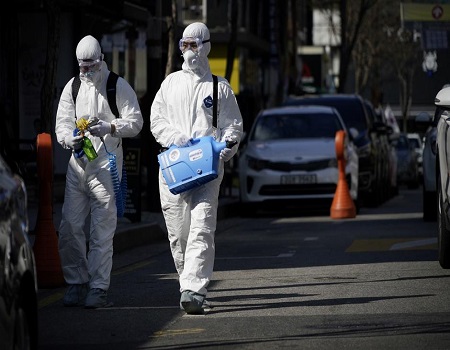With the viral outbreak spreading to more countries, the price of oil has dropped precipitously as global demand weakens even further, Globalnews reported at the weekend.
Hundreds of new cases of the virus that causes the COVID-19 disease have been announced in recent days outside of China. The list of countries touched by the illness has climbed to nearly 60 as Mexico, Belarus, Lithuania, New Zealand, Nigeria, Azerbaijan, Iceland and the Netherlands reported their first cases.
ALSO READ: Coronavirus: Nigerian stock market hits 7 months low
More than 85,000 people worldwide have contracted the illness, with deaths topping 2,900.
Oil industry analysts fear that what they thought was a contained disruption may instead lead to more travel restrictions and even less oil consumed.
“That was the fear all along, that the virus would not be contained in China,” said Claudio Galimberti, head of demand, refining and agriculture at S&P Global Platts. “There are entire cities, and in some cases regions, that are in a lockdown. When you begin to have a lockdown, people work from home, factories shut down, people don’t travel. The impact on oil is very, very bad.”
Oil prices fell dramatically in mid-February, but had been steadily climbing back as the number of new cases of the virus in China slowed. In the last week, however, reports of the spreading virus knocked prices down.
The benchmark for US crude oil fell 16 per cent during the week, settling Friday at $44.76 a barrel. Brent crude, the international standard, dropped 14 per cent for the week to its lowest levels since July 2017, closing Friday at $50.52 a barrel.
ALSO READ: Coronavirus: Nigerian stock market hits 7 months low
Lower prices at the pump, however, aren’t necessarily good for the US economy overall. When energy prices fall, energy companies tend to cut back on investment and jobs.
A freefall in gasoline prices led to a sharp drop in US business investment in 2016, for instance — one reason the country’s economic growth slowed to 1.6 per cent that year from 2.9 per cent in 2015.
When the coronavirus first hit, the Energy Information Administration predicted global oil demand would fall to 100.3 million barrels per day in the first quarter of 2020, down about 900,000 barrels, or 1 per cent, from what was estimated in January.
The agency said it expects global oil demand to rise by 1 million barrels per day in 2020, which is lower than its growth prediction last month of 1.3 million barrels per day this year.
WATCH TOP VIDEOS FROM NIGERIAN TRIBUNE TV
- Let’s Talk About SELF-AWARENESS
- Is Your Confidence Mistaken for Pride? Let’s talk about it
- Is Etiquette About Perfection…Or Just Not Being Rude?
- Top Psychologist Reveal 3 Signs You’re Struggling With Imposter Syndrome
- Do You Pick Up Work-Related Calls at Midnight or Never? Let’s Talk About Boundaries






